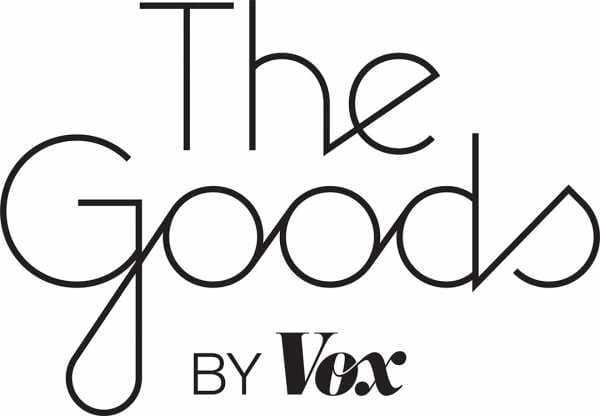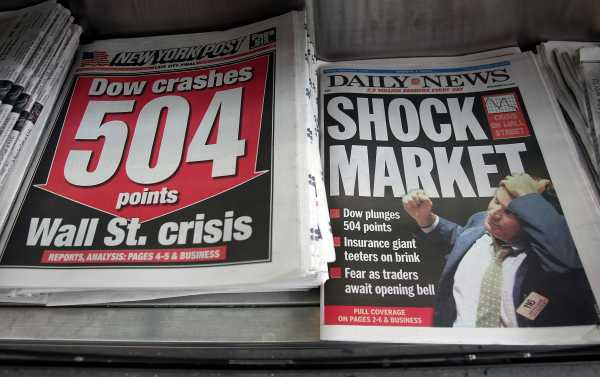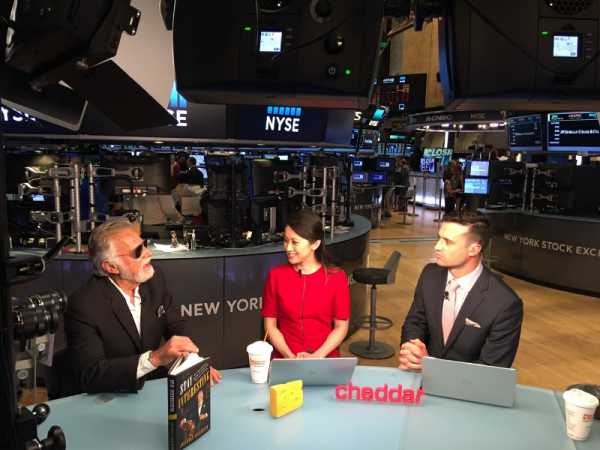
Millennials don’t trust the financial industry. These startups want to change that.
Startups like Cheddar and Grow are packaging the scary world of money into “financial wellness.”
By
Chavie Lieber@ChavieLieber
Sep 26, 2018, 7:00am EDT
Presented by


Share
Tweet
Share
Share
Millennials don’t trust the financial industry. These startups want to change that.
tweet
share

One spring morning in New York City’s Financial District, several besuited men couldn’t help but stop and gaze at a rather out-of-place sign hanging from the New York Stock Exchange building.
“Follow us on Pinterest!” read the enormous red banner.
A few weeks later they stopped again, this time in front of a yellow sign reading, “Follow us on a Snapchat!”
These promos are the handiwork of Matthew Kobach, the digital and social media manager at the NYSE. A former social media lecturer at Indiana University, Kobach was hired three years ago to, among other things, help make the dense, complex, and frankly boring world of stocks more approachable, specifically to millennials. And in 2018, that means social media.
“I don’t think people expect the New York Stock Exchange to have thorough material on Snapchat or Pinterest, but if those are channels a younger audience values, it’s where we are going to put together great educational materials,” Kobach says. “We want to pull back the curtain and demystify financial concepts.”
While social media might be a go-to destination for people in their 20s and 30s, the stock market isn’t. It’s been a decade since the Great Recession, and even though the demographic wasn’t hurt personally, millennials are still scared of the stock market — hence the rise of cryptocurrencies.

But Kobach can think of ways to whet their appetite online. The Pinterest page of the NYSE, for example, has boards like “financial literacy,” with pinned infographics on the different types of stocks and how the stock market works. But there’s also one called “VIPs at the NYSE” that features photos of celebrities like DJ Khaled, Adriana Lima, and Jessica Simpson visiting the floor. Publicly traded companies often have celebrities as investors or faces of the brand, and so the NYSE has relatively unfettered access to big names.
“We see it as sugar with medicine,” Kobach explains. “If we can interview a celebrity for 60 seconds on Snapchat and that gets someone interested in the financial markets, then so be it. A-Rod has some really good investment advice that some CEOs couldn’t even give!”
The NYSE has been beefing up its social media presence over the past year. It’s not the only one trying to make investing simple and sexy. Over the past few years, several startups have sprouted up with the same intention. They aren’t selling finance; they are selling the idea of finance.
Ten years after the worst financial crisis in history, researchers at Deloitte have concluded that young professionals today have a “general distrust in financial institutions,” and it’s no wonder: Many millennials were in college or working their first jobs when they watched the American economy crash and burn. Few had firsthand experience with the stock market, and in the decade since, they’ve stayed away, even with all the seemingly good news that the economy is safe once again.
Market research from Facebook found that millennials feel investment banks are like “used car salesmen,” and financial advisers have complained for years that young people won’t hire them. The business intelligence company RFi Group found that when it comes to personal data, there’s more public trust in companies like PayPal and Amazon than in banks. (This study was done, perhaps not so coincidentally, during the Wells Fargo scandal.)
Millennials were largely in college or working their first jobs when they watched the American economy crash and burn
But professionals in their late 20s and 30s now have plenty of disposable income, with their total net worth expected to hit $24 trillion by 2020, according to UBS. As a response to all this potential, tons of investment startups — like Robinhood, Stash, Cadre, Betterment, Wealthfront, and Ellevest, just to name a few — have popped up, eager to earn the trust (and money) of millennials. These companies follow the direct-to-consumer model; digital first, typical minimalist advertising, and an easy interface that resembles, well, Tinder.
But where to start when you don’t even understand basic concepts? To help, a slew of financial education startups have jumped into the space too.
Just steps away from the flashy signs hanging off of the NYSE building, Alex Lieberman and a team of eight put together Morning Brew, a daily finance newsletter for millennials he describes as the Skimm for business.
“Our generation is extremely interested in business and finance, but they feel like there’s never been more clutter,” he says from his WeWork office.
Lieberman started Morning Brew three years ago with co-founder Austin Rief while they were still classmates at the University of Michigan’s Stephen Ross School of Business. Lieberman had a job at Morgan Stanley lined up and was helping classmates with mock interviews.
“One question I would always ask was, ‘How do you keep up with the business world?’ And literally everyone would say, ‘I read the Wall Street Journal or the Financial Times because I have to, but it’s dense, dry, and it doesn’t resonate with me,’” he says. “Students interested in finance even admitted they didn’t understand some very basic financials concepts.”

Lieberman began emailing around a daily roundup of business news. Word spread to schools like Wharton and University of North Carolina, and soon he was flooded with requests to join the list. The newsletter now has 500,000 subscribers. Content includes updates on cryptocurrency, evaluations on companies like Juul, and the chronicles of Tesla’s Elon Musk.
Occasionally writers will produce original content, like interviews with CEOs, but the newsletter is mostly based on what’s buzzing around the web, which Lieberman says busy millennials don’t have time to parse. Getting financial news from traditional publications can also be unappealing, he adds: In a highly politicized — and polarized — media landscape, there are plenty of conservative millennials working in finance who “don’t know who to trust.”
Morning Brew’s subscriber number is peanuts compared to the Skimm’s 7 million, but it also boasts an open rate of 47 percent, which is enviable in the world of newsletters. The average reader is 28 years old and has an income of $95,000. Twenty percent of its readers are college students, but the rest work in real estate, retail, tech, private equity, banking, and so on. An opportunity to reach this type of spending-savvy millennial has advertisers including Citigroup, Microsoft, Quip, and Casper lining up for sponsorship. (Lieberman declined to share revenue figures with Vox.)
Untangling the financial world is also a goal of Jennifer Barrett’s, a Wall Street Journal and CNBC graduate who started Grow, a money website aimed at millennials. Grow is owned by Acorns, the personal investing app that lets users invest spare change from bank transactions and credit card purchases.
Barrett says she was enticed by the opportunity when she was approached two years ago because, as a finance reporter, “I feel like I had been writing and editing the exact same type of headlines my entire career.” Grow, she says, gives young readers a real chance at understanding money.
“The fact that most Americans can’t save $400 for unexpected expenses and don’t know how important retirement savings are is terrifying,” she says. “Here is one place that is offering education alongside an actual investment tool.”
Grow doesn’t deliver day-of finance news the way Morning Brew does, but instead focuses on “financial wellness,” as Barrett calls it. It provides 101 lessons like how to start investing and when to stop renting. Grow launched video content earlier this summer, and Barrett says the goal is to break down concepts like the Federal Reserve or interest rates, which she says are “basic concepts most people are too embarrassed to admit they don’t understand.” Acorns has some 3.5 million users, and it promotes Grow from its app.
“You could read an entire business story and still not know what any of it means because the jargon is difficult to understand, and intentionally so”
The world of finance is in dire need of a rebrand for younger investors, Barrett notes. While companies like Goldman Sachs will probably always have cachet, the stuffy suit-and-tie image just doesn’t seem cool anymore, especially compared to startup culture, where there’s no shortage of 30-something CEOs in hoodies and co-working spaces offering cold brew on tap.
“I think legacy companies, both on the publishing side and within finance itself, are grappling with how to reach this audience — and it’s not just about millennials, but about talking to women too,” she says.
Plus, she adds, there’s the army of gatekeepers: “You’ve been told the financial world is more complex than it actually is, so that you end up hiring someone to manage your money,” she says. “And you could read an entire business story and still not know what any of it means because the jargon is difficult to understand, and intentionally so.”

Acorns is betting big on getting big: It’s raised $152 million from investors, and CEO Noah Kerner has said that its goal is to ultimately “be the mobile place for millennials and their money.” With ongoing efforts of Grow to make finance approachable, it very well could be, and Barrett attributes its success to trust. This coming November, for example, Acorns will roll out a debit card.
The credit card industry is already reeling, since debt-conscious millennials are skeptical of credit cards, and the Acorns debit card nabbed 10,000 preorders within the first few hours it was announced. The debit card is linked to Acorns users’ other bank accounts; transfers and withdrawals are free, and Acorns will deposit up to 10 percent of purchases with some merchants into a user’s Acorns account.
Newsletters and mobile apps are good places to make the financial markets appealing, but video is the golden ticket, at least according to Jon Steinberg. The former BuzzFeed president founded Cheddar, the digital financial news network that’s been dubbed “CNBC for millennials.”
In the two and a half years since Cheddar debuted as a free live stream on platforms like Facebook and Twitter, the network has since expanded into a team of 140 employees and has raised $54 million in funding. It’s cut deals with Sling TV and Hulu, and these days it’s right next to CNN and MSNBC on streaming devices. The company will make $26 million this year, says Steinberg, with most of it coming from advertising.
“Millennials are coming to the point where they have more money and are making decisions around budgeting, spending, and saving for retirement,” says Jeremy Liew, a partner at Lightspeed Venture Partners, which is one of Cheddar’s investors. “They lived through global financial crisis, so while they have a visceral reaction, they are also open to the education about planning ahead. What startups like Cheddar do is hook them with their interests.”
While it’s hard to gauge exactly how many people actually watch Cheddar because it’s distributed across multiple apps and devices, Steinberg says it has “hundreds of millions of organic video views on Facebook, [and] we are now doing tens of millions of organic video views a month on Snapchat, Linkedin, and other platforms.”

Although Cheddar pretty much operates like every other business channel, Steinberg insists the content is specifically aimed at younger audiences.
“Everything about it is younger,” he says. “The anchors, the content selection, delivery, and style. CNBC, CNN, and Fox Business have audiences in their 60s. I think it is hard to serve a lucrative older audience and people in their 20s and 30s at the same time.”
The type of stocks Cheddar covers, for example, are called the Cheddar 50. Whereas other networks will cover tons of publicly traded companies that are earning profits that day, Cheddar turns to the top 50 that it thinks its young viewers are interested in, including Apple, Amazon, Google, Nike, Under Armour, and Yahoo.
“It’s a philosophical switch,” Liam Roecklein, an executive producer at Cheddar, has said. “We talk to the stocks that we think young people are most concerned about. Then there’s talk about startups, entertainment news and entertainment business, sports news and sports business. We talk about VR, robotics, Pokémon Go, and augmented reality. It’s really talking directly to them about what they care about.”
Cheddar is now making a serious push for young adults. In May, it bought MTV Networks on Campus, Viacom’s small college campus cable network. CheddarU, as the network is now called, will be available to 9 million students at 600 campuses. Steinberg claims this acquisition now makes Cheddar “far larger than almost any cable news network in reaching 18-25 year olds.”
Steinberg believes there’s no better way to sell the world of finance to young investors than by getting on the screens of college gyms and cafeterias. Scott Grimes, the executive chair of Uproxx Media, believes he’s got a better idea: texting them.
Grimes is the co-founder and CEO of Stackin’, a digital finance and entertainment media company that boasts (in all caps) that “millions of people watch Stackin’ each month to take control of their money & thrive financially.” Grimes says that when he started Stackin’ in April 2017, it was supposed to be solely focused on Facebook video that was “fun and relatable personal finance content.” Think how to invest in sneakers, why you should invest in legal marijuana, and the fact that kids are expensive AF (cosigned, FYI).
Like many media companies caught up in the “pivot to video” phase, though, Grimes eventually realized that Stackin’ couldn’t rely solely on Facebook to distribute its content. In April, it rolled out text messaging, and Grimes says that now 200,000 people get daily texts about business and finance: “The texts can be personalized by interest, like if you’re buying a home, looking into cryptocurrency, or want to pay off your student debt,” he explains.
There’s also text message trivia on Tuesdays, and finance tips from a bot named Zoey, who is marketed as “your new money bff.”
Zoey texts Stackin’ subscribers with advice like opening a brokerage account, acknowledging that it is “hard AF to pick the right one.”
Grimes says Stackin’, which is based in LA and has a team of 10, is on track to hit 1 million text subscribers by next year. He’s planning to roll out personalized messaging on Facebook Messenger and WhatsApp in the next few months to expand internationally. While growth for him means texting more kids about stocks, Stackin’ still needs to make money. Grimes says it will hit $2 million in revenue, with its main source of income coming from Chime and Ellevest, who pay the startup to recommend their services.
But such a model can only last for so long. It’s only inevitable before the folks writing these paychecks debut content of their own, the way Acorns hired Barrett to start Grow. Grimes says the company will roll out an investment product later this year, although he wouldn’t share details.
What else is on deck? For a startup looking to revolutionize the finance space, Grimes talks about pulling an old-school card: debuting financial consultants. Except, he maintains, because Stackin’ has a relationship with its users — through texting, of course — it’s gained the trust of those who’d otherwise react negatively to something like hiring a financial planner.
Trust is a common theme that comes up for startups selling the financial world. For companies to get ahead, they know they must distance themselves from the mainstream, stuffy world of money. And yet there are still plenty of ties. On Cheddar’s long list of investors is Goldman Sachs. Acorns’s biggest investor is BlackRock, the money management firm of Larry Fink, who’s been described as Wall Street’s most powerful and shadowy kingpin.
Which is to say, the new world of selling the finance industry to millennials is probably a whole lot like the old world of finance itself.
Still, it’s adapted for the digital age, with text messaging, Facebook video, and swipe-and-save investment options that make the obscure and complex industry a tiny bit more penetrable. So if and when the next financial crisis comes, there might be more people prepared — and more people involved.
Sourse: vox.com






